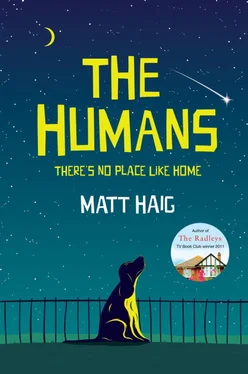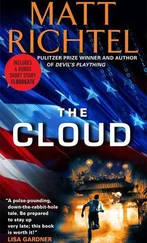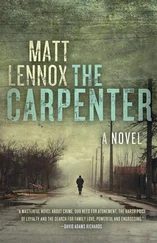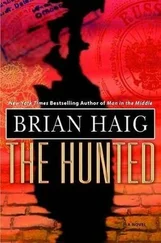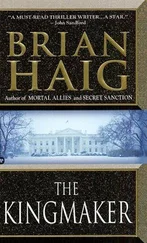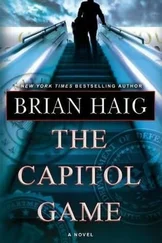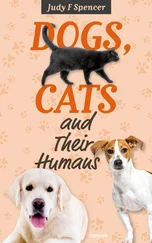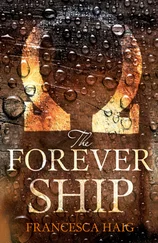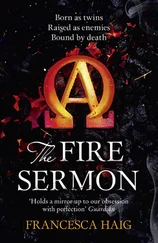‘Do you know what they told me?’ she said.
‘No. What? What did they tell you?’
‘They told me he could stay in.’
‘Right.’
‘It was up to me. I had to say if I thought he was a suicide risk or not. And I said I thought he would be more of a risk in there than out here. They said if he tried anything like this again then there’d be no choice about it. He’d be admitted, and they’d watch him.’
‘Oh. Well, we’ll watch him. That’s what I say. That hospital is full of mad people. People who think they’re from other planets. Stuff like that.’
She smiled a sad smile, and blew a brown tide of ripples across the surface of her drink. ‘Yes. Yes. We’ll have to.’
I tried to understand something. ‘It’s me, isn’t it? It was my fault, for that day I didn’t wear clothes.’
Something about this question switched the mood. Isobel’s face hardened. ‘Andrew, do you really think this was about one day? About your breakdown?’
‘Oh,’ I said, which I knew wasn’t in context. But I had nothing else to say. ‘Oh’ was always the word I resorted to, the one that filled empty spaces. It was verbal tea. The ‘oh’ should have really been a ‘no’, because I didn’t think this was about one day. I thought it was about thousands of days, most of which I hadn’t been there to observe. And so an ‘oh’ was more appropriate.
‘This wasn’t about one event. This was about everything. It’s not obviously solely your fault but you haven’t really been there , have you, Andrew? For all his life, or at least since we moved back to Cambridge, you’ve just not been there.’
I remembered something he’d told me on the roof. ‘What about France?’
‘What?’
‘I taught him dominoes. I swam with him in a swimming pool. In France. The country. France.’
She frowned, confused. ‘France? What? The Dordogne ? Two weeks in the Dordogne and a box of bloody dominoes. Is that your “Get Out of Jail Free” card? Is that fatherhood?’
‘No. I don’t know. I was just giving a… a solid example of what he was like.’
‘He?’
‘I mean I. What I was like.’
‘You’ve been there on holiday. Yes. Yes you have. Unless they were working holidays. Come on, you remember Sydney! And Boston! And Seoul! And Turin! And, and, Düsseldorf!’
‘Oh yes,’ I said, staring at the unread books on the shelves like unlived memories. ‘I remember them vividly. Of course.’
‘We hardly saw you. And when we did see you, you were always so stressed about the lecture you were going to give or the people you were going to meet. And all those rows we had. We have. Until, you know, you got ill. And got better. Come on, Andrew, you know what I’m saying. This isn’t breaking news, is it?’
‘No. Not at all. So, where else have I failed?’
‘You haven’t failed . It’s not an academic paper to be assessed by your peers. It’s not success or failure. It’s our life. I’m not wrapping it in judgemental language. I’m just trying to tell you the objective truth.’
‘I just want to know. Tell me. Tell me things I’ve done. Or haven’t done.’
She toyed with her silver necklace. ‘Well, come on. It’s always been the same. Between the ages of two and four you weren’t back home in time for a single bath or bedtime story. You’d fly off the handle about anything that got in the way of you and your work. Or if I ever came close to mentioning that I had sacrificed my career for this family – at that time when I had been making real sacrifices – you wouldn’t even so much as postpone a book deadline. I’d be shot down in flames.’
‘I know. I’m sorry,’ I said, thinking of her novel, Wider Than the Sky . ‘I’ve been terrible. I have. I think you would be better off without me. I think, sometimes, that I should leave and never come back.’
‘Don’t be childish. You sound younger than Gulliver.’
‘I’m being serious. I have behaved badly. I sometimes think it would be better if I went and never returned. Ever.’
This threw her. She had her hands on her hips but her glare softened. She took a big breath.
‘I need you here. You know I need you.’
‘Why? What do I give to this relationship? I don’t understand.’
She clenched her eyes shut. Whispered, ‘That was amazing.’
‘What?’
‘What you did there. Out on the roof. It was amazing.’
She then made the most complex facial expression I have ever seen on a human. A kind of frustrated scorn, tinged with sympathy, which slowly softened into a deep, wide humour, culminating in forgiveness and something I couldn’t quite recognise, but which I thought might have been love.
‘What’s happened to you?’ She said it as a whisper, nothing more than a structured piece of breath.
‘What? Nothing. Nothing has happened to me. Well, a mental breakdown. But I’m over that. Other than that – nothing.’ I said this flippantly, trying to make her smile.
She smiled, but sadness quickly claimed her. She looked up to the ceiling. I was beginning to understand these wordless forms of communication.
‘I’ll talk to him,’ I said, feeling kind of solid and authoritative. Kind of real. Kind of human. ‘I’ll talk to him.’
‘You don’t have to.’
‘I know,’ I said. And I stood up, again to help when I was supposed to hurt.
Essentially, social networking on Earth was quite limited. Unlike on Vonnadoria, the brain synchronisation technology wasn’t there, so subscribers couldn’t communicate telepathically with each other as part of a true hive mind. Nor could they step into each other’s dreams and have a walk around, tasting imagined delicacies in exotic moonscapes. On Earth, social networking generally involved sitting down at a non-sentient computer and typing words about needing a coffee and reading about other people needing a coffee, while forgetting to actually make a coffee. It was the news show they had been waiting for. It was the show where the news could be all about them.
But on the plus side, human computer networks, I discovered, were preposterously easy to hack into as all their security systems were based on prime numbers. And so I hacked into Gulliver’s computer and changed the name of every single person on Facebook who had bullied Gulliver to ‘I Am the Cause of Shame’, and blocked them from posting anything with the word ‘Gulliver’ in it, and gave each of them a computer virus which I dubbed ‘The Flea’ after a lovely poem. This virus ensured the only messages they would ever be able to send were ones that contained the words ‘I am hurt and so I hurt’.
On Vonnadoria I had never done anything so vindictive. Nor had I ever felt quite so satisfied.
Forever is composed of nows
We went to the park to walk Newton. Parks were the most common destination on dog walks. A piece of nature – grass, flowers, trees – that was not quite allowed to be truly natural. Just as dogs were thwarted wolves, parks were thwarted forests. Humans loved both, possibly because humans were, well, thwarted. The flowers were beautiful. Flowers, after love, must have been the best advert planet Earth had going for it.
‘It doesn’t make sense,’ said Gulliver, as we sat down on the bench.
‘What doesn’t?’
We watched Newton sniffing the flowers, livelier than ever.
‘I was fine. No damage. Even my eye’s better.’
‘You were lucky.’
‘Dad, before I went out on the roof, I’d had twenty-eight diazepam.’
‘You’d need more.’
He looked at me, angry for saying this, as if I was humiliating him. Using knowledge against him.
Читать дальше
